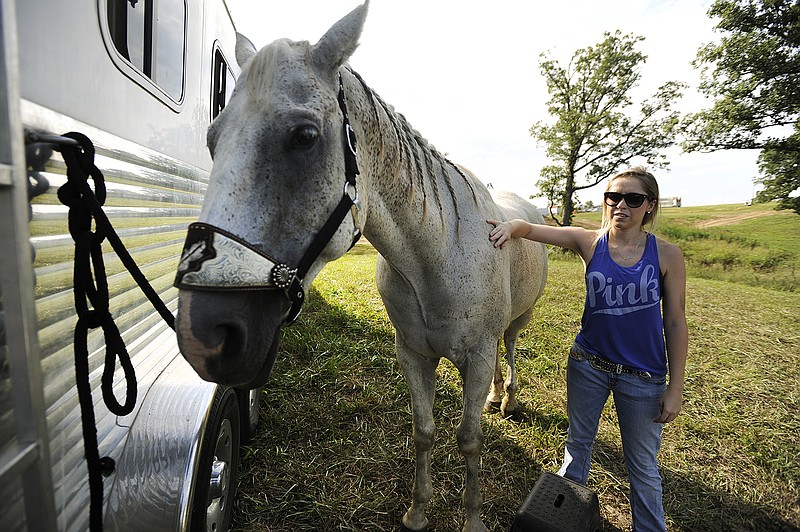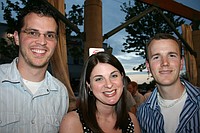Photo Gallery
Craws for Paws
The annual party benefiting the Humane Society of Pulaskin County featured, what else...crawdads, live music and furry friends!
At 5:15 a.m. Tuesday, another early morning of work was under way for the people behind Glory Days Rodeo as they set up inside the arena at the Jefferson City Jaycees Cole County Fair.
But as with all the other early mornings, late nights, travel and even injuries, the rodeo life is worth it for them.
"We've been around it practically all our lives," Ben Ferrell, 39, of Wright City, said. Ferrell co-founded the Wright City-based Glory Days in 2014 with Tom Calliham, 36, of Olean.
"It's always been the lifestyle that I've enjoyed," Ferrell said.
He, Calliham and Ryan Sweet, 19, of Freeburg, stood by or sat in a skid loader at 8:30 a.m. as they took a break between preparing the dirt of the arena for the night's competitions and unloading steel panels off a trailer.
Ferrell explained he was 14 years old when he got involved with rodeo in his home state of Mississippi; that was the age when he could first drive, "when I could get away from the house."
He grew up on a hog farm. Daily life was morning chores, followed by school and then more chores, with no vacations. He did have a horse, though, and he started getting involved in rodeo.
Calliham was 15 when he started riding bulls. He went to a practice pen in Millersburg on Sundays and actually won his first rodeo.
He and Ferrell attended Missouri Valley College in Marshall where they rode roughstock on scholarships. Roughstock refers to bareback and saddle bronc horse riding, as well as bull riding.
Now, Ferrell and Calliham provide rodeo opportunities for youth. "Anybody can enter that wants to," Ferrell said. There are cash prizes throughout seasons, and they award items like spurs and coats at season's end.
They said they have 80-90 contestants at the fair each night of the rodeo.
Glory Days' focus is on roughstock and barrel racing, although they also sub-contract and transport animals to other rodeo events.
Barrel racing is a timed event in which a rider weaves in interlocked figure-eight patterns between three barrels, creating a clover-leaf pattern. It's the event Shelby Newberry, 20, of Jefferson City, came to the rodeo at the county fair for Tuesday night.
Newberry's been barrel racing for four years. Decan was her horse last night, her first barrel horse.
"We're still trying to learn each other," she said of trying to get a faster time than 17 seconds, as she braided Decan's hair with the spare time she had from getting to the fairgrounds early, about 5 p.m. "He likes attention."
She said her pre-race routine is to hang out with friends and eat, then come back to her trailer and saddle Decan about an hour before the event. At pasture, she likes to ride Decan bareback.
She tries to work with Decan three times a week, though it's tough with school; Newberry's a sophomore nursing major at Columbia College. Her parents come watch her ride when they can.
She's loved horses since she was younger. Although she grew up on dirt bikes, she "got tired of that and moved to four legs."
Contestants riding sheep at Glory Days' rodeo might be as young as 3 or 4 years old. Ferrell said it's a good opportunity to get the children used to hitting the dirt and getting back up again.
When it comes time for the bull riding, Sweet's job is to be on or in the dirt as a bullfighter. His job is not at all like what that word means in the Spanish tradition, although he was a bull rider in the past.
"This guy got me started in that," he pointed at Calliham.
As a bullfighter, it's now Sweet's responsibility to distract a bull or protect riders in the dirt after they've been thrown off or have dismounted, even if that means using his own body as a shield and getting stepped on and hooked.
He said he's had two of his front teeth knocked out, though he, Ferrell and Calliham said they all laugh off just about anything but life-threatening injuries.
Ferrell said he's been kicked in the face by a horse, which is part of the reason for a scar above his right upper lip. He's also had leg, jaw and collar bone injures. But for a bull rider, he considers himself fortunate.
"Just like any other sport, it's rough on your body," he said, especially when the late nights and early mornings stack up along with the injuries.
"Bull riding is a lot of balance and mental preparedness," he said of what it takes to train. A rider ideally has a short and not so stocky body, and has to become automatic in their responses to an animal's movements; they have to know when to adjust their own body and with what muscles. "Your body needs to feel the animal."
He quit riding competitively when he was 35 or 36 years old, but his and Calliham's children all ride horses. Ferrell said his children were already on the back of a horse when they were just weeks old.
Ferrell said he wants his children to develop the skills and succeed, and then they can choose whether to continue with the sport later.
"If you can do it, do it," was Newberry's advice to people who might want to get into rodeo. She added it's time-consuming but worth it.
"It's not the money, not being in front of a crowd," Sweet said of what the appeal is for him. "It's just something we all enjoy doing."
Calliham said the appeal for him is about being around his friends all the time. "I guess if I was doing it on my own, it wouldn't be near as fun."


